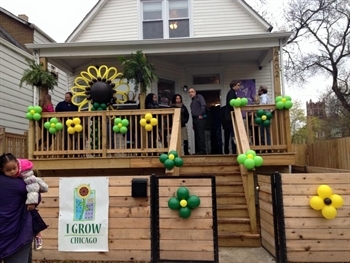
Metropolitan Planning Council
Toni Griffin addresses the audience
If we imagined a city that reflects our ideals in terms of justice and equity, what would it look like? Architect/planner Toni Griffin urged participants to consider this question at the Metropolitan Planning Council (MPC)’s April 21 Urban Think and Drink event, part of a series featuring thought and action leaders in an informal setting, sparking conversations on creating livable urban environments. Griffin broke the night into a series of thought-provoking questions: How do we promote urban justice in the public realm? What if we had metrics for evaluating our public spaces, housing developments, commercial districts or transportation modes for their impact on justice?
As Griffin walked the crowd through how she incorporates terms like equity, inclusion, ownership, access, beauty and voice into her urban design practice and teaching, one audience member in particular was fiercely scribbling notes. To understand what Griffin’s talk meant to her, it’s important to understand where she’s been.

Tameka Lawson
I Grow Chicago's Peace House
For the past two years, Tameka Lawson has been painstakingly building a place of peace and reflection on the corner of 64th and Honore in Chicago’s Englewood neighborhood. Lawson and her team, with nonprofit I Grow Chicago, have worked with residents to build a garden, buy a vacant home now called the Peace House, and hold regular yoga classes on the sidewalk that invite people of all stripes to learn the breathing, stretching and strength poses that calm the mind and create space for reflection. For Lawson, their efforts in Englewood are all about creating a just place, and Griffin’s remarks put language and structure to a philosophy she has long been nurturing. With 16 young people lined up for full-time employment with I Grow Chicago this summer, Lawson is now considering how they can more deliberately incorporate the “values-based approach” that Griffin outlined. One of these values in particular stood out to Lawson: ownership.
When Lawson’s group acquired the vacant building that is becoming the Peace House, they worked with local young people to learn construction skills alongside the contractor rehabbing the house. Teens planted flowers and vegetables and guarded them with fierce pride. For this reason, Lawson gravitated to Griffin’s highlighting of the term “ownership”—the ability to have an equity stake in one’s space. Recognizing that it matters for people to feel ownership about the spaces they inhabit validated Lawson’s inclinations, and named them. She is now planning to do her own naming; the I Grow Chicago 2015 summer T-shirts will read “Just Breathe. Just Yoga. Just City.”
Toni Griffin reminded us that many American communities have yet to complete the work of embracing equity, inclusion, ownership, access, beauty and voice. While no place is ever “finished,” the absence of these values can create tremendous holes in the fabric of community. At the corner of 64th and Honore in Englewood, Tameka Lawson’s mending of such holes looks a lot like justice.